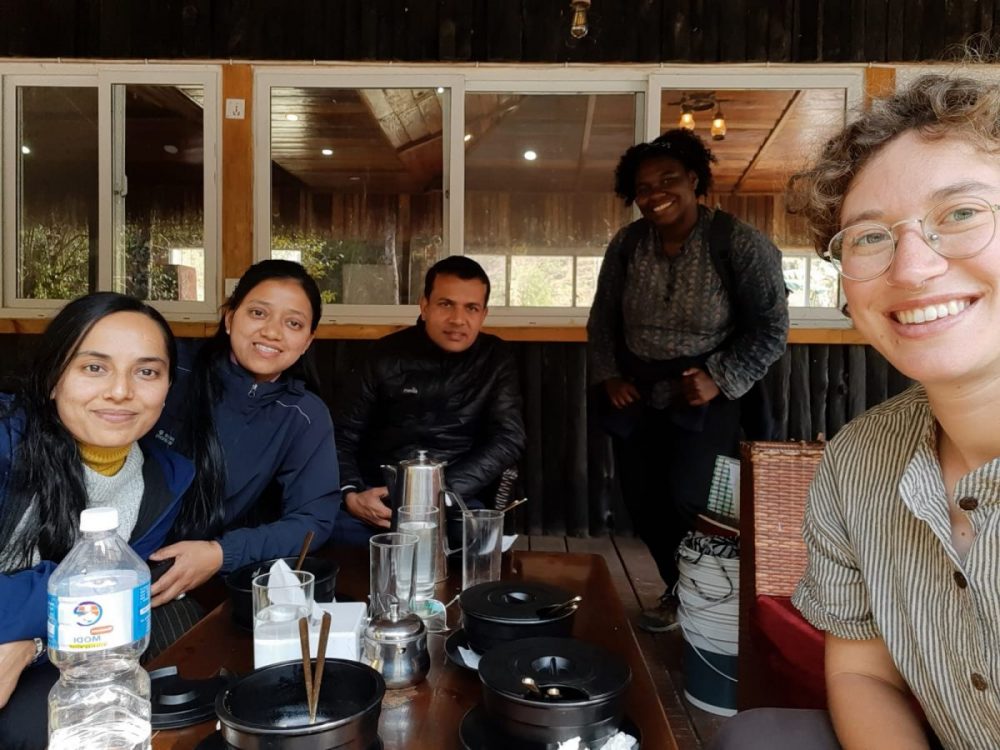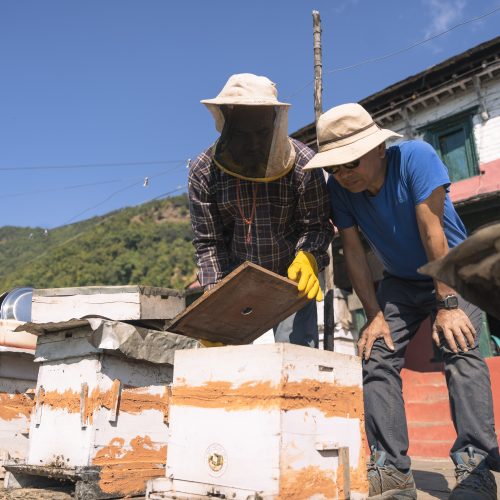Penn State Behrend alum empowers new beekeepers in Nepal with the Peace Corps
By Pearl Patterson (’21) with Tomoe Matsumoto-Hervol

I am Pearl Patterson, a Penn State Behrend alum (’21) working as an agriculture-based Peace Corps volunteer in rural Nepal for two years (June 2023 through August 2025). While at Behrend, I interned with the Sustainable Food Systems Program and Sustainable Behrend, and following graduation, I served for two years as an AmeriCorps VISTA member working to build the capacity of Erie’s Food Policy Advisory Council.
In my current position as a Peace Corps volunteer, I work alongside farmers to create improved management and technology strategies for high-value crops and goods like mushrooms, ginger, turmeric, and honey. With the growing season in full swing comes a renewal of activity and fieldwork for farmers around the globe. Nepali farmers are largely subsistence-based and experience income challenges that threaten their ability to provide themselves with adequately nutritious/diverse diets, necessary healthcare for their households, and quality education for their children. Farmers are also disproportionately women, as able-bodied men and youth are pushed to emigrate to cities and foreign countries in search of economic opportunity.
In the Parbat District, I and my four fellow volunteers, Kim, Kiehl, Tomoe and Mark, have secured for these farmers a district-wide beekeeping grant.

In the first months settling into our Nepali villages, we volunteers spent a lot of time talking to community members and farmers about their interests and challenges. Many of them expressed strong interest in beekeeping ventures but shared that the startup costs were prohibitively expensive. Other farmers had bees but lacked the critical knowledge and skills to care for them appropriately. As a result, farmers who came into the possession of bees often found that the bees would leave quickly to look for a more suitable home.
In response to this, and with the help of donations we have received, the five of us will support 165 farmers (an average of 33 per village) through three main avenues:
- Apis cerana honeybees in modern box hives at a reduced cost of 40% market price
- three days of technical training provided in-village by an experienced Nepali beekeeper
- regular follow-ups, technical support, and beekeeping group/business support for the remainder of our Peace Corps tenure.
Funds raised by this project will allow farmers to learn how to manage bees, maintain hives and provide opportunities to produce and sell bee-related products. And hopefully, farmers and their families will be enjoying honey regularly.

The Training
The training will be conducted by a professional from the local Agriculture Knowledge Center who is well known and trusted throughout our communities.
Funding will help to hire him for three days of training in each of our villages. The subjects of his training will include fundamental topics such as: bee development, forage, pest control, off-season management and feeding, honey harvesting, and absconsion prevention – all of which are necessary for successful bee management.
The Beekeepers’ Groups
In tandem with the training, farmer-led beekeeping groups will be established in our villages with the purpose of community-based sharing of knowledge, resources, and, hopefully, selling power in the future.
Our roles as volunteers will be to conduct house visits, inspect beehives, and provide technical and business management support on an individual and community basis alongside motivated farmers and those already with beekeeping experience. This will last throughout our tenure as volunteers (ending August 2025).
After working with program participants for a year, we will identify four leader farmers who will be responsible for conducting further trainings with the group. This will help ensure the motivation for the work is community owned.
Pearl Patterson (‘21) earned a BA in psychology with a minor in sociology from Penn State Behrend in 2021. Patterson wrote this blog with Tomoe Matsumoto-Hervol, a fellow food security Peace Corps volunteer serving in Parbat, Nepal. Matsumoto-Hervol is from Washington State with a background in food security and dairy farming.
Photos: Local Nepali government officials Susmita, Manisha and Umesh and volunteers Kiehl and Pearl meet to discuss project logistics (top right), volunteer Tomoe visiting an experienced beekeeper and one of his hives (middle left), volunteer Kim and a Nepali bee farmer in his village inspecting hives (bottom right).





